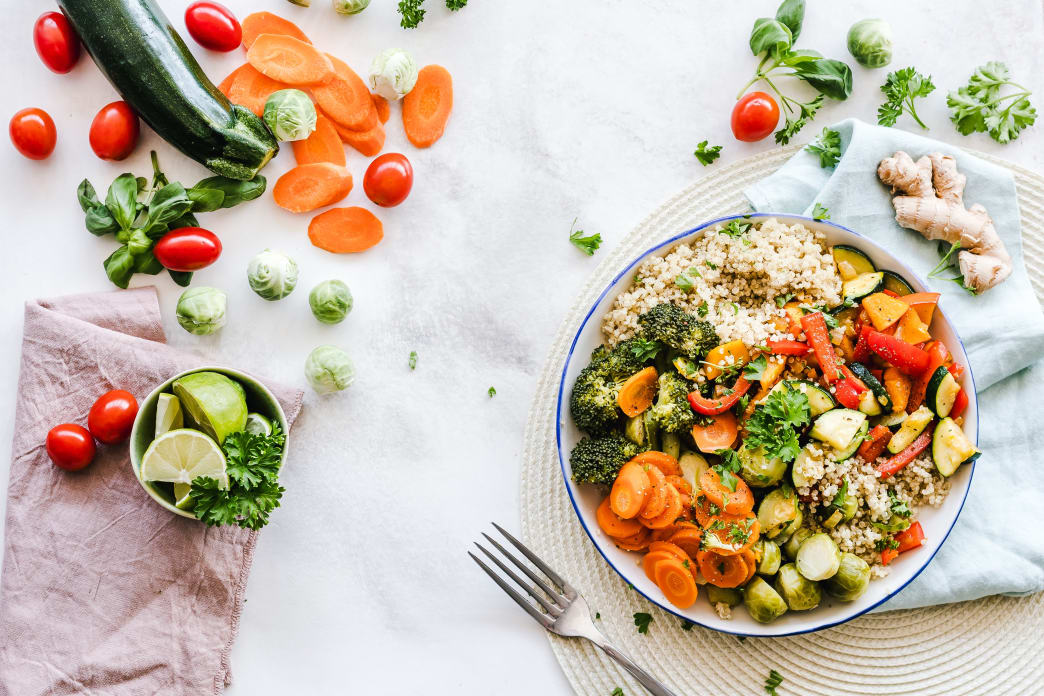

· By Melissa Diane Smith
How to Get Started on the Mediterranean Diet
Reading Time: 5 min
Q: Do you think there is one cuisine or cooking style that is healthier than others?
—Tanya W., Madison, Wis.
A: Perhaps I’m biased (full disclosure: I’m half Greek!), but I think one of the healthiest and easiest ways to cook is Greek, especially low-carb Greek. That means skipping the pita and baklava and preparing poultry, meats, fish, shellfish, and a wide variety of vegetables using the key ingredients of olive oil, lemon, garlic, and flavorful herbs. Eating Greek is not only satisfying and tasty, but it helps protect against degenerative disease and promotes longevity.
What is the Mediterranean Style Diet?
The Mediterranean diet is based on the traditional Greek diet and other similar food patterns of nearby countries. It centers around eating real food and emphasizes extra virgin olive oil and other healthy sources of fats, seafood, and a wide variety of vegetables, fruits, whole grains, and legumes. Refined grain products, and moderate amounts of refined vegetable oils, trans-fats, processed meats, and foods with added sugars are avoided or discouraged. It was ranked as the best diet of 2019 according to U.S. News & World Report.
What Are the Benefits of the Mediterranean Diet?
Numerous scientific studies show that a Mediterranean-style eating plan can offer widespread health benefits, including increased life expectancy, reduced risk of major chronic disease, and improved quality of life. Some research highlights:
Helps Prevent or Reduce Heart Disease
The Mediterranean diet has been found to reduce the burden, or prevent the development, of cardiovascular disease (CVD), and to improve markers of CVD, such as waist-to-hip ratio, blood lipids, and markers of inflammation.
Improves Cognitive Performance
The Mediterranean way of eating helps brain health. too. One study with 1,864 participants found that those who followed the diet were less likely to develop dementia and they experienced better cognitive performance in many areas, especially memory.
Cancer
A review of 83 studies published in October 2017 in the journal Nutrients suggested that the Mediterranean diet may help reduce the risk of cancers such as breast cancer and colorectal cancer, and help prevent cancer-related death. Another study, published in October 2015 in JAMA Internal Medicine, found that women who ate a Mediterranean diet supplemented with extra-virgin olive oil had a 62 percent lower risk of breast cancer than those who ate a low-fat diet.
Other Benefits. Other studies have shown that the Mediterranean diet is linked to lower incidence of depression and lower risk for type 2 diabetes. It also improves blood sugar control more than low-carbohydrate, low-glycemic index, and high-protein diets among people managing diabetes.
A 2016 scientific review concluded:
“In the era of evidence-based medicine, the Mediterranean diet represents the gold standard in preventive medicine, probably due to the harmonic combination of many elements with antioxidants and anti-inflammatory properties.”
What Foods Are in a Mediterranean Diet?
If you’re interested in a Greek-style Mediterranean diet, include these foods:
Olive Oil
Use extra virgin olive oil when preparing foods. Olive oil is loaded with beneficial monounsaturated fatty acids and powerful antioxidants, and has been linked to many health benefits, including less inflammation, better brain health, protection against heart disease and stroke, and the ability to help fight cancer.
Some people think that olive oil shouldn’t be used in cooking, but that’s not true. Research shows that with its high monounsaturated fatty acid and antioxidant content, olive oil stands up well to heat. One study published in 2018 found that extra virgin olive oil is the most stable cooking oil.
Lemons
Lemons, another staple in Greek cuisine, provide vitamin C and bioflavonoids as well as smaller amounts of B vitamins and minerals. Research shows that consuming lemon juice controls high blood pressure, dizziness, and nausea; may help provide relief from indigestion and constipation; and soothes respiratory disorders.
Lemons are used in many popular Greek dishes, including baked chicken Athenian, broiled lamb chops, shrimp scampi, and avgolemono soup, the Greek version of chicken soup (which is made with chicken, lemon, eggs, and rice).
Garlic
Garlic is one of the earliest documented examples of plants employed for treatment of disease and maintenance of health. Hippocrates, the revered physician who said, “Let food be thy medicine, and medicine be thy food,” prescribed garlic for a variety of conditions.
Modern research indicates that garlic may help improve heart health in a number of ways, may protect against cancer, and is a triple threat against infections, boasting antibacterial, antiviral, and antifungal properties.
Herbs
Instead of loading foods primarily with salt, Greek cooking uses a variety of aromatic herbs, including oregano, marjoram, dill, fennel, mint, rosemary, sage, thyme, and parsley. Each herb has medicinal benefits and adds its own appeal.
Fish and Seafood
Fish and shellfish are an important part of the Greek diet. Sardines, a great source of EPA and DHA omega-3 fatty acids, are one of the most commonly eaten fish in Greece. Baked or broiled fish, such as trout, with olive oil, lemon, and seasonings is a simple, nutritious entrée that is easy to fix.
Shrimp and scallops, which are both high in protein and very low in fat, are the most common types of shellfish used in Greek dishes. They’re also “fast” foods, taking less than 10 minutes to prepare.
Souvlaki
One of the best-known Greek foods is souvlaki or kabobs—small grilled pieces of meat on a skewer, with or without vegetables. Souvlaki is typically made from chicken, lamb, beef, or pork and also can be made with shrimp, scallops, or pieces of a firm fish such as sea bass, mahi-mahi, or swordfish.
Greek Yogurt and Tzatziki (Dairy Products)
Like regular yogurt, Greek yogurt is packed with gut-beneficial probiotics, but it is thicker because the yogurt has been strained to remove the liquid whey. This reduces its lactose content and makes it higher in protein. People following a Greek diet often eat Greek yogurt with fruit, or they eat tzatziki, a dip made with Greek yogurt, cucumbers, olive oil, and herbs.
Hummus
For Greek-style snacking, try veggie sticks with hummus, a dip that has been eaten for thousands of years. It’s made with garbanzo beans, garlic, sesame tahini (sesame seed butter), and olive oil.
Greek Salad and Horiatiki Salad
Made with tomatoes, red onion, cucumber, olives, feta cheese, olive oil, and red wine vinegar, both of these salads are common side dishes. The difference is that Greek salad also contains lettuce and Horiatiki salad does not.
Greens
A high intake of greens is a key component of the Mediterranean diet. Spinach is a green used in many recipes, including horta vrasta, a traditional side dish made with boiled greens topped with salt, pepper, olive oil, and lemon juice. The Greek diet also makes extensive use of endive, dandelion greens, and chicory.
Dolmades are stuffed grape leaves typically filled with rice, herbs, and sometimes meats. Grape leaves are low in calories and have a very high antioxidant content—about 10 times the antioxidant activity of grape juice or pulp.
Fresh Fruit for Dessert
Instead of ice cream or Greek pastries, reach for strawberries, grapes, fresh figs, oranges, or apples.
If you don’t like all Greek foods or have food sensitivities, personalize the diet.I eat more lamb and beef than fish, and I avoid grains and tomatoes. This allows me to avoid symptoms from foods that cause me problems and still enjoy the many health benefits of the Greek diet.
Hope you enjoy these meals with family and friends!
Written by Melissa Diane Smith for Better Nutrition and legally licensed through the Matcha publisher network. Please direct all licensing questions to legal@getmatcha.com.
